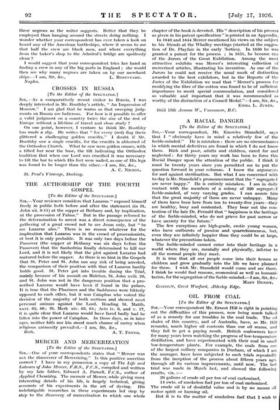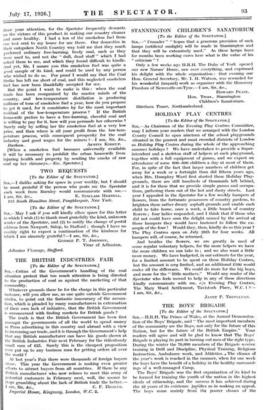OIL FROM COAL
[To the Editor of the SrEcraTon.]
Sin,--Your correspondent Mr. Ernest Hill is right in pointing out the difficulties of this process, now being much talked of as a remedy for our troubles in the coal trade. The oil shales of this country, and of Australia, have, as Mr. Hill remarks, much higher oil contents than our oil seams; and they fail to get a paying result. British coalowners have for many years been watching the progress of low-temperature distillation, and have experimented with their coal in small low-temperature plants. For example, the coals from one of the largest colliery companies in Durham, of which I am the manager, have been subjected to such trials repeatedly from the inception of the process about fifteen years ago, through all its various improvements, until now. The last trial was made in March last, and showed the following results, viz. :— 20 gallons of crude oil per ton of coal carbonized.
14 cwts. of smokeless fuel per ton of coal carbonized.
The crude oil is of doubtful value and is by no means all motor spirit or burning oil.
But it is to the matter of smokeless fuel that I wish to
draw, your attention, for the Spectator frequently descants on the virtues of this product in making our country cleaner and more healthy. I had a ton of the smokeless fuel from one test sent to, my house for use there. Our domestics in their outspoken North Country way told me that they much preferred ordinary free-burning, lively coal, such as they were used to, and not the " dull, dead stuff " which I had asked them to use, and which they found difficult to kindle. And yet, Sir, I assure you this smokeless fuel was quite a good sample of its kind, and could be used by any person who wished to do so. For proof I would say that the COal Strike has left me short of coal, and this neglected smokeless fuel has now been thankfully accepted for use.
But the point I want to make is this : when the coal trade has been reorganized by the master minds of the country, and low-temperature distillation is producing millions of tons of smokeless fuel a year, how do you propose to get it used, for it constitutes by far the most important residual of the low-temperature process ? If the British housewife prefers to have a free-burning, cheerful coal and is willing to pay for it, how will you persuade her otherwise ? Surely only by selling her the smokeless fuel at a very low price, and then where is all your profit from the low-tem- perature process, with consequent prosperity for the coal industry and good wages for the miners ?—I am, Sir, &c., [When a smokeless fuel becomes universally available it will be necessary to prohibit the urban housewife from injuring health and property by sending the smoke of raw coal up her chimneys.—Eo. Spectator.]











































 Previous page
Previous page